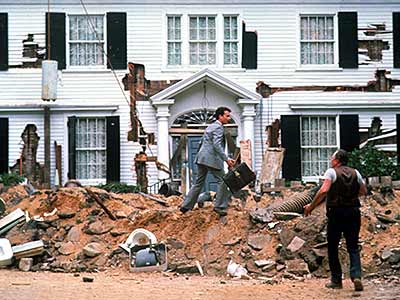5 Tips for Buying a House
Old House, New House



Move slowly, plan each step, then pounce.
About a year and a half ago my wife and I left the house to go to Walmart. We went a different route than normal and saw a house for sale a few blocks up the road that interested my wife. When we went to look at it with a realtor, my wife actually broke down crying. The house was that bad.
But it did start us on the road to house hunting. We'd outgrown our first house and were in a good position to move, so we looked until the right house came along. I'll pass along a few tips that might save you some grief.
1) Don't Rush. In today's market, there is not a line of potential buyers waiting to jump on every house. You have to live in the house, not the realtor. If you've got kids, it may be a compromise of right school plus right price or some other combination. The important part is take your time.
2) Don't Overbuy. Our first house was a cracker box. We quickly outgrew it, but we were very conservative going in. At the time of our first house purchase, my wife had only been with her current job about a year and I owned a small business that wasn't particularly profitable. Our planning and the purchase was based on the worst case scenario of using only one of our incomes to pay all the bills. Too often people buy the most house they can afford. Then the first problem that comes along creates a financial catastrophe. Don't get into that situation.
3) Be Realistic. A larger, older house that needs repairs may be quite a bit less than a newer house that's ready to move into. Unless you are really handy and have an understanding of how expensive construction can be--even when you do it yourself--don't buy a fixer upper. For an extreme example of this, go watch The Money Pit. We've been in our current house over a year and I still have tons of projects left to do before our house is done. It could have happened faster and we could have hired contractors to do the work, but it would have been far more expensive.
4) Save more money. The more money you put down, the less money you pay in interest. While lenders are hesitant to do shorter-term loans for homes, a 10-year note (typical for commercial real estate), will pay off with far less interest. If you put little down, make your normal payments, and pay for 25-30 years, you've bought your house three times over. If you put off that first purchase a year or two and save all of that Income Tax money, plus some, you'll be in a much better financial position.
5) Pay it off fast. Our first house had a 30 year note. We had been paying double payments for the last year or so we were there. The house would have paid off in a total of 12 years if we continued at the same rate. Even making a single payment on the principal at the beginning of the year will speed up the payoff tremendously during the first few years. The early payments are almost all interest. If you make an extra principal payment equal to the entire year's principle, it moves you forward to the next year's principal and interest payments. One payment can shave off a year if done correctly.
Even with our second house, we were conservative. Yes, it's twice the size of our first, but it was well within our means. While we have been going through a learning curve on different types of repairs and learning the idiosyncrasies of a house built in 1947, we're quite happy with our purchase. Waiting also paid off. We bought the house at the end of 2010. It was a Fannie Mae repossession. As Fannie Mae and Freddie Mac were trying to get houses off their books for the year end, they cut prices. Between the time we asked about the house and the time we looked at it, the price dropped about 15%. We ended up buying it for about 75% of it's appraised value. That's in a market where the sales prices run about 10% over tax appraisals.
Save your pennies, set aside money, plan for the worst, and then start looking after you're got the money and are ready. Once you've made your deal, study the amortization tables that are in your loan packet and figure out when to make principal payments that can do you the most good. Paying a CPA or bookkeeper for advice, even if you do your own taxes, will make good financial sense.
Here is what not to do when selling your house: http://dougberry.hubpages.com/hub/5-Tips-for-Selecting-A-Bad-Real-Estate-Agent-or-Realtor-When-Selling-Your-House







